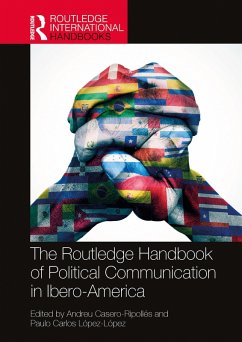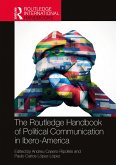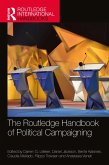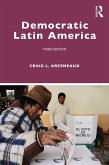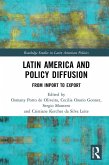The Routledge Handbook of Political Communication in Ibero-America (eBook, PDF)
Redaktion: Casero-Ripollés, Andreu; López-López, Paulo Carlos
46,95 €
46,95 €
inkl. MwSt.
Sofort per Download lieferbar

23 °P sammeln
46,95 €
Als Download kaufen

46,95 €
inkl. MwSt.
Sofort per Download lieferbar

23 °P sammeln
Jetzt verschenken
Alle Infos zum eBook verschenken
46,95 €
inkl. MwSt.
Sofort per Download lieferbar
Alle Infos zum eBook verschenken

23 °P sammeln
The Routledge Handbook of Political Communication in Ibero-America (eBook, PDF)
Redaktion: Casero-Ripollés, Andreu; López-López, Paulo Carlos
- Format: PDF
- Merkliste
- Auf die Merkliste
- Bewerten Bewerten
- Teilen
- Produkt teilen
- Produkterinnerung
- Produkterinnerung

Bitte loggen Sie sich zunächst in Ihr Kundenkonto ein oder registrieren Sie sich bei
bücher.de, um das eBook-Abo tolino select nutzen zu können.
Hier können Sie sich einloggen
Hier können Sie sich einloggen
Sie sind bereits eingeloggt. Klicken Sie auf 2. tolino select Abo, um fortzufahren.

Bitte loggen Sie sich zunächst in Ihr Kundenkonto ein oder registrieren Sie sich bei bücher.de, um das eBook-Abo tolino select nutzen zu können.
The Routledge Handbook of Political Communication in Ibero-America addresses the relationship between communication, politics and digital technologies in Latin American and the Iberian Peninsula, a geographical space linked by social, cultural and linguistic aspects.
- Geräte: PC
- mit Kopierschutz
- eBook Hilfe
Andere Kunden interessierten sich auch für
![The Routledge Handbook of Political Communication in Ibero-America (eBook, ePUB) The Routledge Handbook of Political Communication in Ibero-America (eBook, ePUB)]() The Routledge Handbook of Political Communication in Ibero-America (eBook, ePUB)46,95 €
The Routledge Handbook of Political Communication in Ibero-America (eBook, ePUB)46,95 €![The Routledge Handbook of Political Campaigning (eBook, PDF) The Routledge Handbook of Political Campaigning (eBook, PDF)]() The Routledge Handbook of Political Campaigning (eBook, PDF)46,95 €
The Routledge Handbook of Political Campaigning (eBook, PDF)46,95 €![Communication in Global Jihad (eBook, PDF) Communication in Global Jihad (eBook, PDF)]() Jonathan MatusitzCommunication in Global Jihad (eBook, PDF)33,95 €
Jonathan MatusitzCommunication in Global Jihad (eBook, PDF)33,95 €![Democratic Latin America (eBook, PDF) Democratic Latin America (eBook, PDF)]() Craig L. ArceneauxDemocratic Latin America (eBook, PDF)70,95 €
Craig L. ArceneauxDemocratic Latin America (eBook, PDF)70,95 €![Elections and Social Networks around the World (eBook, PDF) Elections and Social Networks around the World (eBook, PDF)]() Elections and Social Networks around the World (eBook, PDF)42,95 €
Elections and Social Networks around the World (eBook, PDF)42,95 €![Radically Civil (eBook, PDF) Radically Civil (eBook, PDF)]() Robert DanischRadically Civil (eBook, PDF)21,95 €
Robert DanischRadically Civil (eBook, PDF)21,95 €![Latin America and Policy Diffusion (eBook, PDF) Latin America and Policy Diffusion (eBook, PDF)]() Latin America and Policy Diffusion (eBook, PDF)43,95 €
Latin America and Policy Diffusion (eBook, PDF)43,95 €-
-
-
The Routledge Handbook of Political Communication in Ibero-America addresses the relationship between communication, politics and digital technologies in Latin American and the Iberian Peninsula, a geographical space linked by social, cultural and linguistic aspects.
Dieser Download kann aus rechtlichen Gründen nur mit Rechnungsadresse in A, B, BG, CY, CZ, D, DK, EW, E, FIN, F, GR, HR, H, IRL, I, LT, L, LR, M, NL, PL, P, R, S, SLO, SK ausgeliefert werden.
Produktdetails
- Produktdetails
- Verlag: Taylor & Francis eBooks
- Seitenzahl: 516
- Erscheinungstermin: 31. Oktober 2024
- Englisch
- ISBN-13: 9781040153468
- Artikelnr.: 72284842
- Verlag: Taylor & Francis eBooks
- Seitenzahl: 516
- Erscheinungstermin: 31. Oktober 2024
- Englisch
- ISBN-13: 9781040153468
- Artikelnr.: 72284842
- Herstellerkennzeichnung Die Herstellerinformationen sind derzeit nicht verfügbar.
Andreu Casero-Ripollés is Full Professor of Journalism and Political Communication at Universitat Jaume I de Castelló, Spain. He has been Dean of the Faculty of Humanities and Social Sciences and Director of the Department of Communication Sciences. He is President of the Spanish Society of Journalism (SEP). He has been included by Stanford University within the 2% of the most cited scientists in the world in Scopus for his discipline. Paulo Carlos López-López is Associate Professor in the Department of Political Science and Sociology at Universidade de Santiago de Compostela, Spain. His lines of research are political communication, political behavior and emotions in social media.
0. Introduction: a multipolar and de-Westernized vision of political
communication in the digital age Part I: The core elements of political
communication 1. Political Communication in Latin America 2. Media systems
in Latin America 3. The Latin American political discourse 4. Agenda
Setting Studies in Iberian and Latin America Part II: Polarization,
populism and hate speech 5. Populism, Media, Journalism and Political
Communication in Latin America 6. Pop Politics Beyond Populism: Popular
Culture as Political Communication 7. Affective Polarization in Latin
America 8. Patterns of dissemination of expressions of hate and
polarization in Ibero-America Part III: Political participation, activism
and social movements 9. Social Movements, Democracy and Political
Communication in Latin America 10. Digital feminist activism in Latin
America: connected crowds and hackfeminism 11. Political Participation and
Technology: Continuities and discontinuities in Southern Cone and Brazil
12. Indigenism and Sumak Kawsay in digital media. Coverage of the Political
Agenda Setting in Ecuador, Peru and Bolivia Part IV: Digitalization of
political communication 13. The behaviour of digital communities in
Ibero-American democracies 14. A reflection about artificial intelligence
and algorithms in political communication. Instruments at the service of
parties? 15. Platformization: State of the Art and Challenges for Political
Communication in Latin America 16. Role of memes and political image in
political communication in Latin America Part V: Elections and campaigns in
a context of change 17. New tools, changes, and situations of the
communication management of electoral campaigns in Latin America 18.
Electoral desinformation and fact-checking in the Iberian Peninsula and
Latin America 19. Election Campaigns and Election Debates in Ibero-America:
from Television to Second Screens 20. Government communication: Basic
Principles and Their Application to Practical Cases Part VI: Regional study
of Political Communication in Latin America 21. Political communication
studies over the last two decades: a view from the International Center of
Advanced Communication Studies for Latin America, Ciespal 22.
Latinobarometro, an instrument of regional development Part VII: Political
Communication in South America 23. Political Communication and Technologies
in Brazil: beyond Bolsonaro 24. Political communication in Argentine and
social media (2010-2021). Personalism, personalization and political
Internet users 25. Political communication in Peru: between the crisis of
the parties, political instability, and the central role of media and
networks 26. Political communication mediated by digital media:
Misinformation and its impact on politics in Chile 27. Ecuador: between the
digital impulse and the return of traditional powers 28, Political
communication in Uruguay. Strong state, strong parties, stable traditional
media, and weak polarization in social media Part VIII: Political
Communication in Central America, Mexico and the Caribbean 29. Populism and
Social Media Campaigning in Central America 30. El Salvador: Nayib Bukele,
the Twitter president. A failed policy? 31. The evolution of political
communication in Mexico: From a delayed beginning to the consolidation of
cyberspace 32. Political communication and institutionality in Cuba 33.
Political communication in 21st century Venezuela: from Chavismo to
Madurismo 34. Artificial Intelligence, Technology and Political
Communication in Colombia Part IX: Political Communication in Iberian
Peninsula 35. Digital electoral campaigns in Spain over thirty years:
information, unidirectionality and professionalized personalization 36.
Electoral Campaigns in Portugal: Transitioning from the Analog to the
Digital Realm 37. Lying on social media. Disinformation strategies of
Iberian populist radical right
communication in the digital age Part I: The core elements of political
communication 1. Political Communication in Latin America 2. Media systems
in Latin America 3. The Latin American political discourse 4. Agenda
Setting Studies in Iberian and Latin America Part II: Polarization,
populism and hate speech 5. Populism, Media, Journalism and Political
Communication in Latin America 6. Pop Politics Beyond Populism: Popular
Culture as Political Communication 7. Affective Polarization in Latin
America 8. Patterns of dissemination of expressions of hate and
polarization in Ibero-America Part III: Political participation, activism
and social movements 9. Social Movements, Democracy and Political
Communication in Latin America 10. Digital feminist activism in Latin
America: connected crowds and hackfeminism 11. Political Participation and
Technology: Continuities and discontinuities in Southern Cone and Brazil
12. Indigenism and Sumak Kawsay in digital media. Coverage of the Political
Agenda Setting in Ecuador, Peru and Bolivia Part IV: Digitalization of
political communication 13. The behaviour of digital communities in
Ibero-American democracies 14. A reflection about artificial intelligence
and algorithms in political communication. Instruments at the service of
parties? 15. Platformization: State of the Art and Challenges for Political
Communication in Latin America 16. Role of memes and political image in
political communication in Latin America Part V: Elections and campaigns in
a context of change 17. New tools, changes, and situations of the
communication management of electoral campaigns in Latin America 18.
Electoral desinformation and fact-checking in the Iberian Peninsula and
Latin America 19. Election Campaigns and Election Debates in Ibero-America:
from Television to Second Screens 20. Government communication: Basic
Principles and Their Application to Practical Cases Part VI: Regional study
of Political Communication in Latin America 21. Political communication
studies over the last two decades: a view from the International Center of
Advanced Communication Studies for Latin America, Ciespal 22.
Latinobarometro, an instrument of regional development Part VII: Political
Communication in South America 23. Political Communication and Technologies
in Brazil: beyond Bolsonaro 24. Political communication in Argentine and
social media (2010-2021). Personalism, personalization and political
Internet users 25. Political communication in Peru: between the crisis of
the parties, political instability, and the central role of media and
networks 26. Political communication mediated by digital media:
Misinformation and its impact on politics in Chile 27. Ecuador: between the
digital impulse and the return of traditional powers 28, Political
communication in Uruguay. Strong state, strong parties, stable traditional
media, and weak polarization in social media Part VIII: Political
Communication in Central America, Mexico and the Caribbean 29. Populism and
Social Media Campaigning in Central America 30. El Salvador: Nayib Bukele,
the Twitter president. A failed policy? 31. The evolution of political
communication in Mexico: From a delayed beginning to the consolidation of
cyberspace 32. Political communication and institutionality in Cuba 33.
Political communication in 21st century Venezuela: from Chavismo to
Madurismo 34. Artificial Intelligence, Technology and Political
Communication in Colombia Part IX: Political Communication in Iberian
Peninsula 35. Digital electoral campaigns in Spain over thirty years:
information, unidirectionality and professionalized personalization 36.
Electoral Campaigns in Portugal: Transitioning from the Analog to the
Digital Realm 37. Lying on social media. Disinformation strategies of
Iberian populist radical right
0. Introduction: a multipolar and de-Westernized vision of political
communication in the digital age Part I: The core elements of political
communication 1. Political Communication in Latin America 2. Media systems
in Latin America 3. The Latin American political discourse 4. Agenda
Setting Studies in Iberian and Latin America Part II: Polarization,
populism and hate speech 5. Populism, Media, Journalism and Political
Communication in Latin America 6. Pop Politics Beyond Populism: Popular
Culture as Political Communication 7. Affective Polarization in Latin
America 8. Patterns of dissemination of expressions of hate and
polarization in Ibero-America Part III: Political participation, activism
and social movements 9. Social Movements, Democracy and Political
Communication in Latin America 10. Digital feminist activism in Latin
America: connected crowds and hackfeminism 11. Political Participation and
Technology: Continuities and discontinuities in Southern Cone and Brazil
12. Indigenism and Sumak Kawsay in digital media. Coverage of the Political
Agenda Setting in Ecuador, Peru and Bolivia Part IV: Digitalization of
political communication 13. The behaviour of digital communities in
Ibero-American democracies 14. A reflection about artificial intelligence
and algorithms in political communication. Instruments at the service of
parties? 15. Platformization: State of the Art and Challenges for Political
Communication in Latin America 16. Role of memes and political image in
political communication in Latin America Part V: Elections and campaigns in
a context of change 17. New tools, changes, and situations of the
communication management of electoral campaigns in Latin America 18.
Electoral desinformation and fact-checking in the Iberian Peninsula and
Latin America 19. Election Campaigns and Election Debates in Ibero-America:
from Television to Second Screens 20. Government communication: Basic
Principles and Their Application to Practical Cases Part VI: Regional study
of Political Communication in Latin America 21. Political communication
studies over the last two decades: a view from the International Center of
Advanced Communication Studies for Latin America, Ciespal 22.
Latinobarometro, an instrument of regional development Part VII: Political
Communication in South America 23. Political Communication and Technologies
in Brazil: beyond Bolsonaro 24. Political communication in Argentine and
social media (2010-2021). Personalism, personalization and political
Internet users 25. Political communication in Peru: between the crisis of
the parties, political instability, and the central role of media and
networks 26. Political communication mediated by digital media:
Misinformation and its impact on politics in Chile 27. Ecuador: between the
digital impulse and the return of traditional powers 28, Political
communication in Uruguay. Strong state, strong parties, stable traditional
media, and weak polarization in social media Part VIII: Political
Communication in Central America, Mexico and the Caribbean 29. Populism and
Social Media Campaigning in Central America 30. El Salvador: Nayib Bukele,
the Twitter president. A failed policy? 31. The evolution of political
communication in Mexico: From a delayed beginning to the consolidation of
cyberspace 32. Political communication and institutionality in Cuba 33.
Political communication in 21st century Venezuela: from Chavismo to
Madurismo 34. Artificial Intelligence, Technology and Political
Communication in Colombia Part IX: Political Communication in Iberian
Peninsula 35. Digital electoral campaigns in Spain over thirty years:
information, unidirectionality and professionalized personalization 36.
Electoral Campaigns in Portugal: Transitioning from the Analog to the
Digital Realm 37. Lying on social media. Disinformation strategies of
Iberian populist radical right
communication in the digital age Part I: The core elements of political
communication 1. Political Communication in Latin America 2. Media systems
in Latin America 3. The Latin American political discourse 4. Agenda
Setting Studies in Iberian and Latin America Part II: Polarization,
populism and hate speech 5. Populism, Media, Journalism and Political
Communication in Latin America 6. Pop Politics Beyond Populism: Popular
Culture as Political Communication 7. Affective Polarization in Latin
America 8. Patterns of dissemination of expressions of hate and
polarization in Ibero-America Part III: Political participation, activism
and social movements 9. Social Movements, Democracy and Political
Communication in Latin America 10. Digital feminist activism in Latin
America: connected crowds and hackfeminism 11. Political Participation and
Technology: Continuities and discontinuities in Southern Cone and Brazil
12. Indigenism and Sumak Kawsay in digital media. Coverage of the Political
Agenda Setting in Ecuador, Peru and Bolivia Part IV: Digitalization of
political communication 13. The behaviour of digital communities in
Ibero-American democracies 14. A reflection about artificial intelligence
and algorithms in political communication. Instruments at the service of
parties? 15. Platformization: State of the Art and Challenges for Political
Communication in Latin America 16. Role of memes and political image in
political communication in Latin America Part V: Elections and campaigns in
a context of change 17. New tools, changes, and situations of the
communication management of electoral campaigns in Latin America 18.
Electoral desinformation and fact-checking in the Iberian Peninsula and
Latin America 19. Election Campaigns and Election Debates in Ibero-America:
from Television to Second Screens 20. Government communication: Basic
Principles and Their Application to Practical Cases Part VI: Regional study
of Political Communication in Latin America 21. Political communication
studies over the last two decades: a view from the International Center of
Advanced Communication Studies for Latin America, Ciespal 22.
Latinobarometro, an instrument of regional development Part VII: Political
Communication in South America 23. Political Communication and Technologies
in Brazil: beyond Bolsonaro 24. Political communication in Argentine and
social media (2010-2021). Personalism, personalization and political
Internet users 25. Political communication in Peru: between the crisis of
the parties, political instability, and the central role of media and
networks 26. Political communication mediated by digital media:
Misinformation and its impact on politics in Chile 27. Ecuador: between the
digital impulse and the return of traditional powers 28, Political
communication in Uruguay. Strong state, strong parties, stable traditional
media, and weak polarization in social media Part VIII: Political
Communication in Central America, Mexico and the Caribbean 29. Populism and
Social Media Campaigning in Central America 30. El Salvador: Nayib Bukele,
the Twitter president. A failed policy? 31. The evolution of political
communication in Mexico: From a delayed beginning to the consolidation of
cyberspace 32. Political communication and institutionality in Cuba 33.
Political communication in 21st century Venezuela: from Chavismo to
Madurismo 34. Artificial Intelligence, Technology and Political
Communication in Colombia Part IX: Political Communication in Iberian
Peninsula 35. Digital electoral campaigns in Spain over thirty years:
information, unidirectionality and professionalized personalization 36.
Electoral Campaigns in Portugal: Transitioning from the Analog to the
Digital Realm 37. Lying on social media. Disinformation strategies of
Iberian populist radical right
